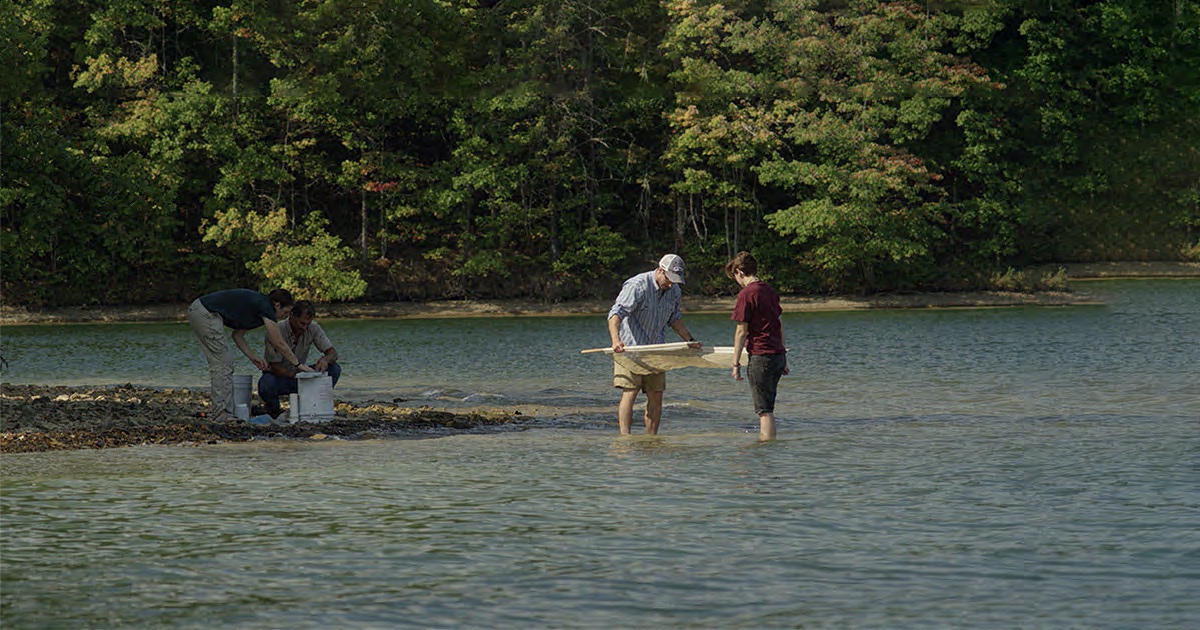CORE COURSES
Take the following courses:
4 CreditsN, WK-SP, CTGISPre-Req or Co-Req: FYC-101 or EN-110 or EN-109.ESS-100 Environmental Systems I
ESS-110 Environmental Systems II
3 CreditsN, SW-LEPrerequisite or corequisite: FYC-101 or EN-110 or EN-109. (NOTE: ESS-100 is not a prerequisite for ESS-110.)
BI-101 General Biology I
4 Credits
CH-142 Integrated Chemistry Principles I
3 CreditsNCorequisite CH143
CH-143 Integrated Chem Principles I Lab
1 CreditsN, QSCH142 is a corequisite of this course. A lab fee is associated with this course.
ESS-230 Environmetrics
3 CreditsN, QS, CTGES, CTGISPrerequisites: Sophomore standing and permission of the instructor.
ESS-310 Water Resources I
3 CreditsQM, NPrerequisites: ESS100.
ESS-330 Geographical Information Systems
4 CreditsCTGISNote: A special course fee is assessed. Prerequisite: ESS100.
ESS-337 Environmental Law
3 CreditsS, CTGISPrerequisites: ESS-100 or PS-110. Must have sophomore standing or above.
ESS-345 Ichthyology
4 CreditsN, QS, CTGISPrerequisites: BI-101 or BI-105
ESS-445 Fishery Science & Management
4 CreditsH, N, QSPrerequisite: BI-101 or BI-105
FISHERIES AND AQUATIC SCIENCE
Take one of the following courses:
ESS-328 Limnology
4 CreditsNTake BI105 and BI121 and ESS100 or permission of the instructor.
ESS-346 Freshwater Invertebrates
4 CreditsN, QSPrerequisites: BI 105/121, junior-level standing, or permission of instructor.
ADDITIONAL BIOLOGICAL SCIENCE
Take 4 credits from the following courses:
BI-102 General Biology II
4 CreditsPrerequisite: BI-101 or BI-105
BI-300 General Ecology
3 CreditsNPrerequisites: BI-101 and BI-102. Corequisite: BI-301.
BI-301 General Ecology Lab
1 CreditsNCorequisite: BI300
BI-360 Vertebrate Zoology
3 CreditsNSuggested corequisites: BI361. Prerequisites: BI105 and Ecology/Biology related POE.
BI-361 Vertebrate Zoology Lab
2 CreditsNCorequisite: BI360
BI-432 Environmental Toxicology
3 CreditsNPrerequisites: Take 2 courses from BI105 or CH142 or ESS100 and permission of the instructor.
ESS-325 Conservation Biology
3 CreditsS, NPrerequisites: ESS-100 or BI-101 or BI-105.
PHYSICAL SCIENCES
Take 8 credits from the following courses:
GL-100A Environmental Geology
3 CreditsN
GL-126 Environmental Geochemistry
3 CreditsN
GL-305 Hydrogeology
3 CreditsN
ESS-410 Water Resources II
3 CreditsQS, N, CTGISPrerequisites: ESS310 and MA130
CH-144 Integrated Chemistry Principles II
3 CreditsNPrerequisite: CH-142
CH-145 Integrated Chemistry Principles II Lab
1 CreditN, QSPrerequisite: CH-143. A lab fee is associated with this course.
PC-200 General Physics I
3 CreditsN, QMCorequisite: PC-200L.
PC-200L General Physics Lab I
1 CreditNCorequisites: PC200.
MATH AND STATISTICS
Take 3 credits from the following courses:
ESS-335 Quantitative Ecology
4 CreditsQS(Lec/Lab; 4 cr hr; Spring years; pre-req ESS 110, ESS 230-Environmetrics, or consent)
BI-305 Biostatistics
4 CreditsN, QS, CTGESPrerequisites: BI106 or ESS100
MA-130 Calculus I
4 CreditsN, QM
MA-205 Elementary Statistics
4 CreditsN, QS, WK-SPPrerequisite: FYC-101 or EN-110 or EN-109
MA-220 Introduction to Probability & Statistics
4 CreditsN, QS, CTGESPrerequisite: MA130
HUMAN DIMENSIONS AND POLICY
Take 3 credits from the following courses:
3 CreditsN, WK-SIPrerequisite or corequisite: FYC-101ESS-206 Global Environmental Issues
ESS-305 Environmental Economics
3 CreditsS
ESS-324 Natural Resource Management
3 CreditsNPrerequisites: ESS100 and BI105 and BI121. A special course fee is assessed.
ESS-380 Sense of Place Seminar
3 CreditsCA, CWNote: There is a course fee assessed. Prerequisites: ESS100 or permission of the instructor.
CONN-312 Science and Society
3 CreditsCONN
CAPSTONE
Take one of the following courses:
1-3 CreditsS, CTGISPrerequisite: ESS200 and Senior Standing or permission of the instructor. 1-3 CreditsN, S, CTGISPrerequisites: ESS100 and Junior or Senior standing or permission.ESS-400 Senior Capstone I
ESS-401 Senior Capstone II
POE Credit Total = 61
Students must complete at least 18 credits at the 300/400-level. Any course exception must be approved by the advisor and/or department chair.
 skip to content
skip to content




